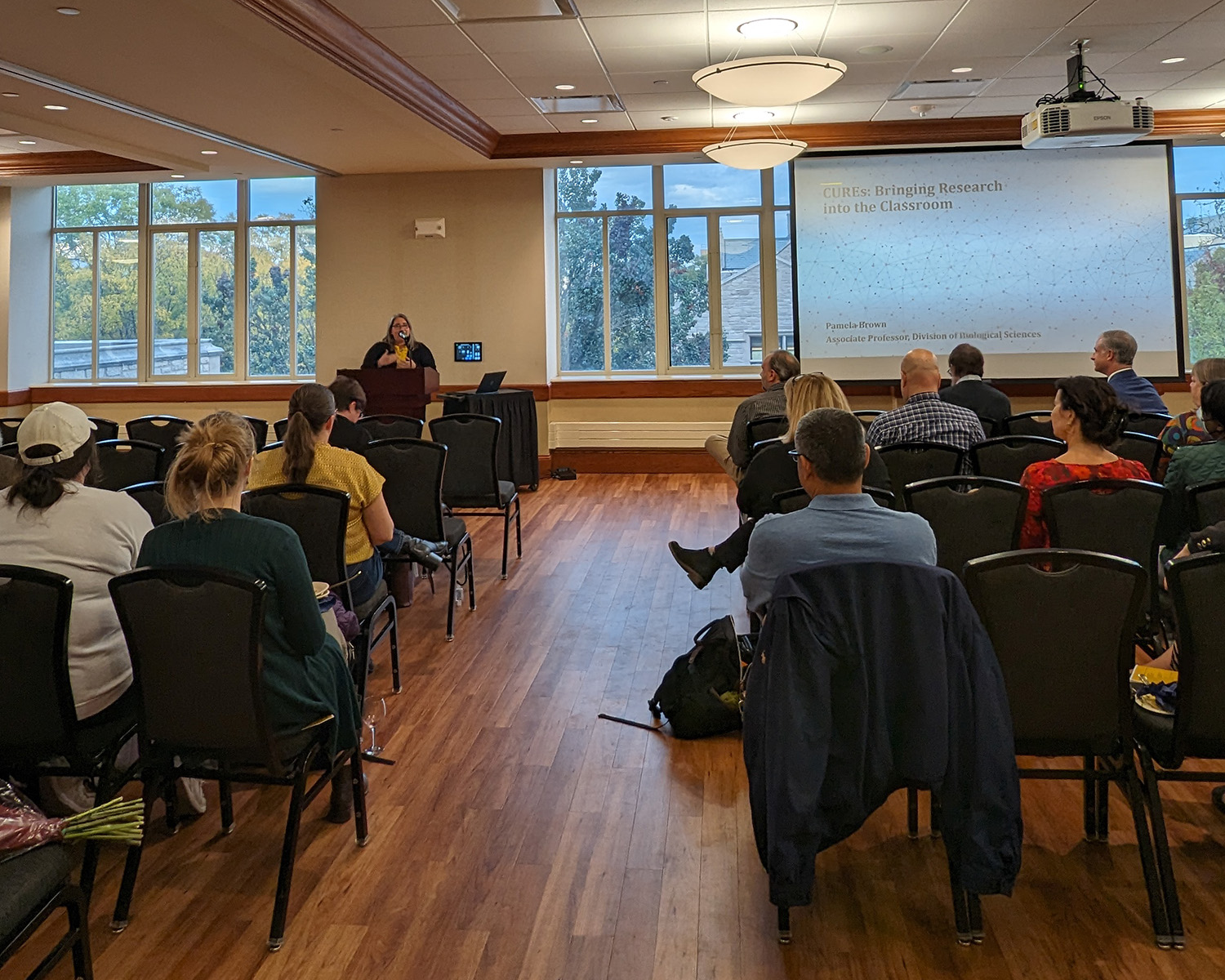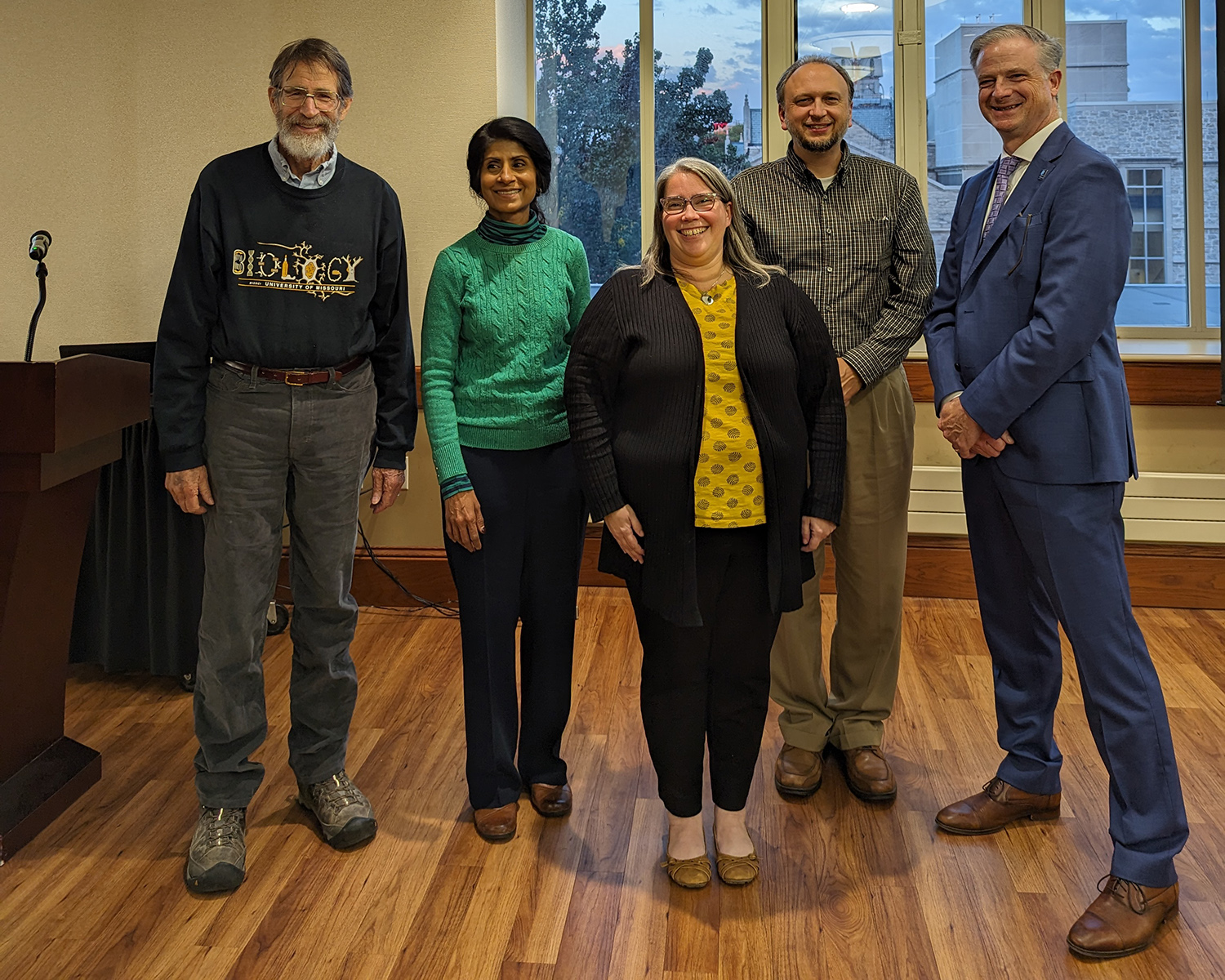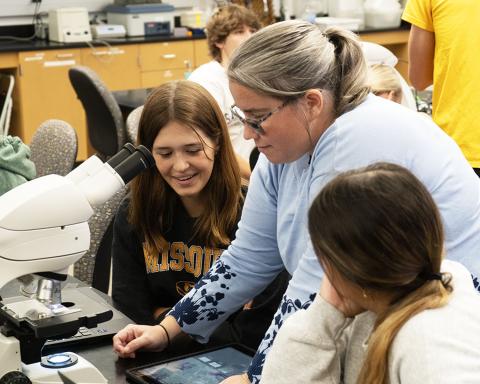Dr. Pamela Brown Celebrated for Distinguished Teaching
Dr. Pamela Brown Celebrated for Distinguished Teaching
Associate Professor Pamela Brown was selected for the 2023 Maxine Christopher Shutz Award and Lecture for Distinguished Teaching. The award recognizes her efforts to engage undergraduates in active learning experiences and to personalize the college experience of students.
“Dr. Brown makes everything we do better,” commented Professor David Schulz, director of the Division of Biological Sciences, at an award reception hosted in Brown’s honor last week. “Our department is lucky to have someone of her caliber to generate innovative ideas, but more importantly to bring those ideas to fruition.”
At a reception in her honor, Dr. Brown delivered a public lecture she titled, “CUREs: Bringing Research into the Classroom.” Photo courtesy the MU Office of the Provost.
At the reception, Dr. Brown delivered a public lecture she titled, “CUREs: Bringing Research into the Classroom.” In her speech, she shared how a research experience she had as an undergraduate changed her own life trajectory: from being a pre-med student to someone with an affinity for researching microbes. Now, as an associate professor of biological sciences in the College of Arts and Science and a STEM Faculty Fellow for the Honors College, Dr. Brown strives to engage Mizzou students in research practices as part of their own undergraduate experience. The focus of her speech was on a course-based research experience (CURE) she has developed to provide an authentic experience to a broad spectrum of Mizzou undergraduates, from first-semester freshman in the Honors College to advanced biological sciences students.
CUREs are a relatively new form of instruction in the undergraduate landscape. They are a learning experience in which whole classes of students are engaged in a hands-on investigation of a problem that is of interest to the scientific community. Students learn how to ask research questions, design and carry out experiments, analyze data, and communicate their findings. But what sets CUREs apart, shared Dr. Brown, is a focus on a big societal problem beyond the classroom.
“One of the goals of the CUREs is that you’re joining a team of scientists working toward a solution to real world problems. You’re not just a student in a class,” she shared.
Brown’s CURE is centered around the emergence of antibiotic-resistant microbes. The microbial focus is not surprising. A microbiologist, Dr. Brown is internationally recognized for her work on the principles that govern bacterial shape. As Schulz observed in his letter nominating her for the award, “Pam loves bugs, ‘bugs’ being the term by which microbiologists affectionately refer to their bacterial study subjects….She recognized early in her career that the relative ease by which bacteria can be manipulated in the laboratory (even by novice experimentalists) offers an opportunity to revolutionize young scientists understanding of the natural world.” Dr.
Brown has developed two CURE courses: an upper-level “Microbiology Lab” for advanced biology majors as well as an “Honors Introduction to STEM Research” for first-semester freshman in the Honors College. In both, students are tasked with collecting soil samples, isolating bacteria from the soil, and then screening them for antibiotic activity against close, but safe, relatives of multi-drug resistant pathogens that pose a current global health concern. Although the course learning objectives differ between the courses, students in both classes learn to complete experiments, use real lab equipment and materials, keep digital lab notebooks, design figures, write abstracts, and present their research at a public forum. “Students do exactly what researchers do,” pointed out Curators’ Distinguished Teaching Professor Bethany Stone of Brown’s Honors course. “They are not only learning research, lab, and communication skills, but are also working together to seek out solutions to a real-world problem.”
Dr. Brown (center) with Dr. George Smith, Dr. Latha Ramchand, Dr. David Schulz, and Dr. Cooper Drury. Photo courtesy the MU Office of the Provost.
The inquiry-based nature of the CURE suits Dr. Brown’s teaching style and philosophy. As a teacher, she enjoys exploring topics through engaged learning activities rather than by lecturing.
“For me, there’s just something special about being in the teaching lab and watching the light bulbs go off as they understand the significance of an observation. Seeing in those moments when they know something that no one else in the world knows is a remarkable experience,” she said.
As for students, they vote with their feet. Her microbiology lab is a popular option for biology majors. Enrollment in her newer Honors course jumped from seven students last fall (the first time she offered it) to 66 students this fall, requiring the addition of two more sections and co-instructors to accommodate the demand.
Geography major Asher Ferguson took Dr. Brown’s “Introduction to STEM Research” course his first semester at Mizzou. Like many of his fellow freshman, he started college “having never worked in a lab before (thanks to COVID)” and thought the course might help make up for this lack of experience. As he shared, it more than met his expectation. “Because of this class, I will be giving a poster presentation to dozens of strangers on my own research project in microbiology at the end of this week, something I never would have thought possible just months ago. What Dr. Brown has taught me about research, the scientific method, collaboration, and perseverance will stick with me no matter where I end up.”
It has been several years since Caroline Dunn took Brown’s upper-level “Microbiology Lab” course, but she remembers it as one of the “more interesting” and “practical” classes she had as an undergraduate.
“We didn’t just walk through a string of unrelated experiments set out of us. We isolated our own bacteria to study and identify over the semester. This meant that we regularly had to apply the immediate knowledge we were learning to a bigger picture. We had to compare different results and see how they worked together,” she recalled in a letter. “By thinking through these things, we were able to identify all our separate bacteria. This exercise in critical thinking not only trained us, but also gave us a more realistic example of how work occurs in the real world.”
By teaching her to think critically, Dunn credits Brown for laying the foundation for her current success in graduate school.
“I am extremely grateful that Dr. Brown helped me develop the tools to really think about what I am doing. I spend my days trying to piece together biological puzzles. There is no answer sheet and no professor who can give me the answers. I have to think through these problems and do experiments that appropriately address my questions,” she wrote.
The classroom is not the only place where Dr. Brown is impacting access to undergraduate research experiences. As the Director for Undergraduate Research and the Biology Honors Program, she helps facilitate and support independent research lab experiences for undergraduates in the biology program. She also has personally mentored 25 undergraduate researchers in her own lab. In 2021, she was named MU’s Undergraduate Research Mentor of the Year in recognition of her excellence in mentorship.
Dr. Brown's other teaching awards are the Provost’s Outstanding Junior Faculty Teaching Award, the College of Arts and Science Purple Chalk Teaching Award, and the Alumnae Anniversary Fund for the Recognition of Faculty Women Award.


